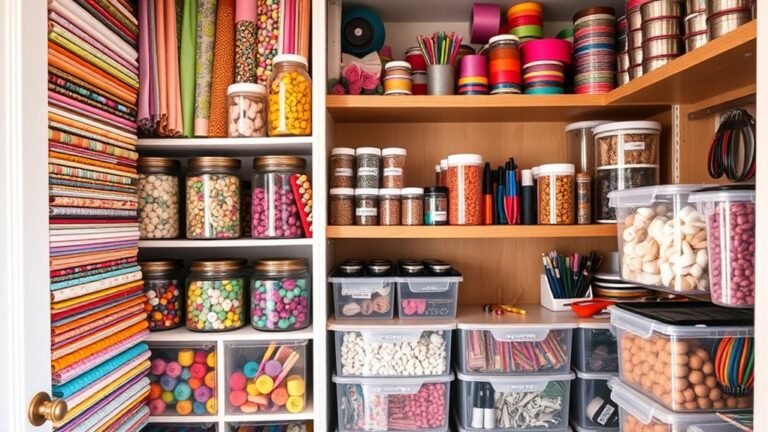How to Reduce Plastic Waste in Your Cleaning Routine
You can cut down plastic waste in your cleaning routine by switching to reusable tools like microfiber cloths and bamboo brushes that last longer and compost easily. Opt for concentrated cleaning products to reduce packaging, or make your own natural cleaners using vinegar and baking soda. Buying in bulk and using refillable containers also help minimize plastic use. Supporting brands with sustainable packaging makes a difference too. Keep exploring for more practical ways to create an eco-friendly cleaning habit.
Choose Reusable Cleaning Tools

One simple way to cut down on plastic waste is by choosing reusable cleaning tools. Instead of disposable wipes or plastic scrubbers, you can embrace microfiber cloths that last for months and clean effectively without harsh chemicals. These cloths save you money and free you from constantly buying single-use products. Bamboo brushes offer another eco-friendly alternative; they’re sturdy, biodegradable, and avoid the plastic buildup that clogs landfills and oceans. Switching to these tools gives you control over your impact on the planet, aligning your cleaning habits with your values of freedom and sustainability. By making this small change, you reduce clutter and plastic waste, creating a cleaner home and a cleaner conscience—without limiting your ability to maintain a fresh space.
Opt for Concentrated Cleaning Products
You can cut down on plastic waste by choosing concentrated cleaning products since they use less packaging and last longer. Just make sure you follow the proper dilution instructions to get the best results without wasting product. This simple switch helps you clean effectively while reducing your environmental impact.
Benefits of Concentrated Formulas
Although concentrated cleaning products might require a bit more care when measuring, they offer a simple way to cut down on plastic waste. By using less packaging and reducing transportation volume, you’re directly lowering your environmental impact. Plus, concentrated formulas stretch further, meaning fewer purchases and real cost savings over time. You get more freedom to clean effectively without the guilt of excess plastic.
| Benefit | Impact on You | Environmental Gain |
|---|---|---|
| Less Plastic Use | Fewer bottles to buy | Reduced plastic waste |
| Smaller Packages | Easier storage | Lower carbon footprint |
| Longer Lasting | Saves money | Less frequent disposal |
| Efficient Cleaning | Stronger results | Less chemical waste |
| Convenience | Lightweight | Reduced transport emissions |
Proper Dilution Techniques
When using concentrated cleaning products, mastering proper dilution techniques is key to maximizing their effectiveness and minimizing waste. You’ll want to follow recommended dilution ratios to guarantee the product works well without overusing it. Using proper measurement techniques, like measuring cups or marked bottles, helps you mix the right amount of concentrate with water. This not only saves you money but reduces plastic waste since you’re reusing containers rather than buying new full-sized products all the time. By diluting correctly, you also avoid harsh chemical residues, making your cleaning routine safer and more eco-friendly. Embrace these simple steps to gain freedom from excess packaging, control your cleaning power, and contribute to a cleaner planet with every spray.
Make Your Own Natural Cleaners

You can cut down on plastic waste by making your own natural cleaners using a few basic ingredients like vinegar, baking soda, and lemon juice. These simple items are effective and easy to combine into various DIY recipes for different cleaning tasks. Let’s explore some straightforward recipes you can try at home today.
Essential Ingredients to Use
Natural ingredients like vinegar, baking soda, and lemon juice are your best allies for creating effective, eco-friendly cleaners at home. These natural ingredients offer freedom from harsh chemicals and plastic packaging. To get started, focus on these essentials:
- White vinegar – a powerful disinfectant and deodorizer.
- Baking soda – a gentle abrasive that lifts stains and neutralizes odors.
- Lemon juice – naturally antibacterial with a fresh scent.
- Castile soap – a biodegradable soap base to cut through grease.
Simple DIY Cleaner Recipes
Since reducing plastic waste starts with what you put in your cleaning products, making your own cleaners is a simple way to cut down on single-use packaging. You can mix basic eco friendly ingredients like vinegar, baking soda, and lemon juice to create powerful, natural cleaners. For example, combine equal parts water and vinegar in a reusable spray bottle for an all-purpose cleaner. Add a few drops of essential oil for a fresh scent. For tougher grime, sprinkle baking soda on surfaces, then spray with vinegar to fizz away dirt. Homemade cleaning not only frees you from plastic waste but also gives you control over what’s in your products. It’s a straightforward, liberating step toward a cleaner home and planet without relying on store-bought, plastic-packaged items.
Buy in Bulk to Minimize Packaging
Buying cleaning products in bulk can considerably cut down on the amount of plastic packaging you bring into your home. When you embrace bulk purchasing, you’re choosing freedom from constant trips and excessive waste. Here’s how it benefits you:
- Reduces single-use plastic by minimizing packaging waste.
- Saves money by buying larger quantities at lower prices.
- Encourages reuse of containers—less plastic tossed out.
- Supports a lifestyle that values practical packaging alternatives.
Support Brands With Sustainable Packaging

When you choose brands committed to sustainable packaging, you’re helping reduce plastic waste at its source. Supporting eco friendly brands means you’re backing companies that prioritize using sustainable materials like recycled paper, biodegradable plastics, or plant-based alternatives. This choice cuts down on the demand for single-use plastics and encourages innovation in greener packaging solutions. You don’t have to sacrifice convenience or quality; many sustainable brands offer products just as effective as traditional ones. By making thoughtful purchases, you’re exercising your freedom to influence the market and push for a cleaner planet. Every time you opt for packaging that’s designed to break down naturally or be reused, you contribute to a cycle that lessens environmental impact and preserves your freedom to live plastic-free.
Use Refillable Cleaning Containers
Choosing brands with sustainable packaging is a great step, but you can take it further by using refillable cleaning containers. These let you break free from endless single-use plastic and embrace sustainable materials that last. Here’s how to make the switch:
- Pick refillable containers made from durable, eco-friendly materials.
- Buy cleaning solutions in bulk or concentrate to refill your containers.
- Label each container clearly to avoid mix-ups and waste.
- Clean and reuse containers regularly to keep them effective and safe.
Avoid Single-Use Cleaning Wipes
Although single-use cleaning wipes seem convenient, they contribute considerably to plastic waste and landfill overflow. You can break free from this cycle by choosing eco friendly alternatives that offer the same ease without harming the planet. Many sustainable brands now provide reusable cloths or biodegradable wipes made from natural fibers. These options not only reduce plastic pollution but also save you money in the long run. Switching to washable microfiber cloths or bamboo-based wipes empowers you to clean effectively while honoring your commitment to sustainability. By opting out of single-use products, you reclaim control over your environmental impact and embrace a cleaner, freer lifestyle—one that respects the Earth and your values. It’s a simple change with a powerful effect on reducing plastic waste in your routine.
Recycle and Repurpose Cleaning Supplies
Since cleaning supplies often come in sturdy containers and materials, you can easily recycle or repurpose them instead of tossing them out. Taking control of your waste means you’re not just following the crowd—you’re setting your own path. Here’s how you can do it:
- Upcycle bottles as plant sprayers or storage for homemade cleaners.
- Donate supplies you no longer need to community centers or shelters.
- Refill sturdy containers with bulk cleaning products to cut down on plastic use.
- Use empty jars to store small cleaning items like brushes or cloths.
Frequently Asked Questions
How Often Should I Deep Clean to Reduce Overall Waste?
You should aim for a deep cleaning frequency of once every one to two months to keep things fresh without going overboard. This balance helps you focus on waste reduction strategies by preventing excess use of cleaning products and disposable materials. By not over-cleaning, you free yourself from unnecessary chores and reduce clutter, making your routine more efficient and eco-friendly. It’s all about finding freedom in simplicity while caring for your space.
Can Compostable Sponges Replace Plastic Ones Effectively?
Isn’t it worth choosing products that align with your values? Compostable sponges made from compostable materials can replace plastic ones effectively without sacrificing cleaning effectiveness. They break down naturally, freeing you from contributing to plastic pollution. While they might wear out faster, their eco-friendly nature means you’re embracing a sustainable lifestyle without compromise. So, why not enjoy the freedom of a cleaner home and planet simultaneously?
What Are the Best Eco-Friendly Gloves for Cleaning?
When choosing eco-friendly gloves for cleaning, you’ll want ones made from natural rubber or biodegradable materials. They offer strong protection while breaking down more easily than traditional plastics, so you’re not trapped in harmful waste cycles. Plus, natural rubber feels flexible and comfortable, giving you freedom to move as you clean. Look for brands committed to sustainability—your hands stay safe, and the planet benefits too.
How to Safely Dispose of Hazardous Cleaning Chemicals?
Disposing of hazardous cleaning chemicals is like steering through a maze—you need a clear path for chemical safety. Don’t just toss them in the trash; instead, check your local hazardous disposal guidelines. Many communities offer special drop-off sites or events. Keep containers sealed and labeled to avoid accidents. By handling hazardous disposal responsibly, you’re protecting yourself and the environment, giving you the freedom to clean safely without worry.
Are Steam Cleaners a Plastic-Free Cleaning Option?
You’re wondering if steam cleaners are a plastic-free cleaning option. While they do contain some plastic components, their steam cleaner benefits—like reducing the need for chemical cleaners and disposable wipes—make them an eco-friendly alternative. Using steam means you’re cutting down on waste and harsh chemicals, giving you freedom from constant plastic use. So, although not 100% plastic-free, steam cleaners are a great step toward greener cleaning.






